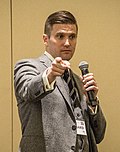A 2023 poll by the Pew Research Center found that 4% of Americans in the United States self-identified as atheists. [4] This is an increase from 3.1% of Americans in 2014. [3] However, in 2014, 9% of Americans agreed with the statement "Do not believe in God" while 2% agreed with the statement "Do not know if they believe in God". [3] According to a poll by non-profit Public Religion Research Institute (PRRI) in 2023, 4% of Americans were atheist and 5% were agnostic. [5] Polling by Gallup in 2022 showed that 17% of respondents replied "No" when asked "Do you believe in God?" in a binary fashion, but when worded differently in 2023, Gallup found that 12% of respondents replied they "Do not believe in" God and 14% replied they were "Not sure about" the existence of God. [6] According to Gallup, there are variations in their polling results because they ask about God in three different wordings, each with a different result. [7]
Contents
- Demographics (2014)
- Age
- Education
- Gender
- Generation
- Household income
- Immigrant status
- Marital status
- Metro area
- Political affiliation
- Parental status
- Political ideology
- Race
- Region
- Religion
- Sexual orientation
- State/federal district
- Public officials
- United States Representatives
- United States Senators
- Governors
- State legislators
- Mayors
- City councils
- Political views
- Views of atheists
- Views about atheists
- Groups that include atheists
- List of American atheists
- Organizations
- See also
- References
- Further reading
- External links
| Part of a series on |
| Atheism |
|---|
 |
According to the 2014 General Sociological Survey, the number of atheists and agnostics in the U.S. grew over the previous 23 years. In 1991, only 2% identified as atheist, and 4% identified as agnostic; while in 2014, 3.1% identified as atheists, and 5% identified as agnostics. [8]
According to the 2008 ARIS, only 2% the US population was atheist, while 10% were agnostics. [9]
One 2018 research paper using indirect methods estimated that 26% of Americans are atheists, which is much higher than the 3%-11% rates that are consistently found in surveys. [10] However, methodological problems have been identified with this particular study; in particular, it has been posted that many people might not have a binary outlook to the question of the existence of God. [11]
Accurate demographics of atheism are difficult to obtain since conceptions of atheism and self-identification are context dependent by culture. [12] In 2009, Pew stated that only 5% of the US population did not have a belief in a god and out of that small group only 24% self-identified as "atheist", while 15% self-identified as "agnostic" and 35% self-identified as "nothing in particular". [13] In 2023, Pew stated that 23% of atheists believe in a higher power, but not a god. [14] In 2024, Pew stated that 31% of atheists believe in a sprit or soul. [15]

























